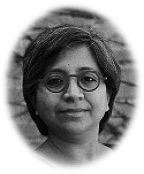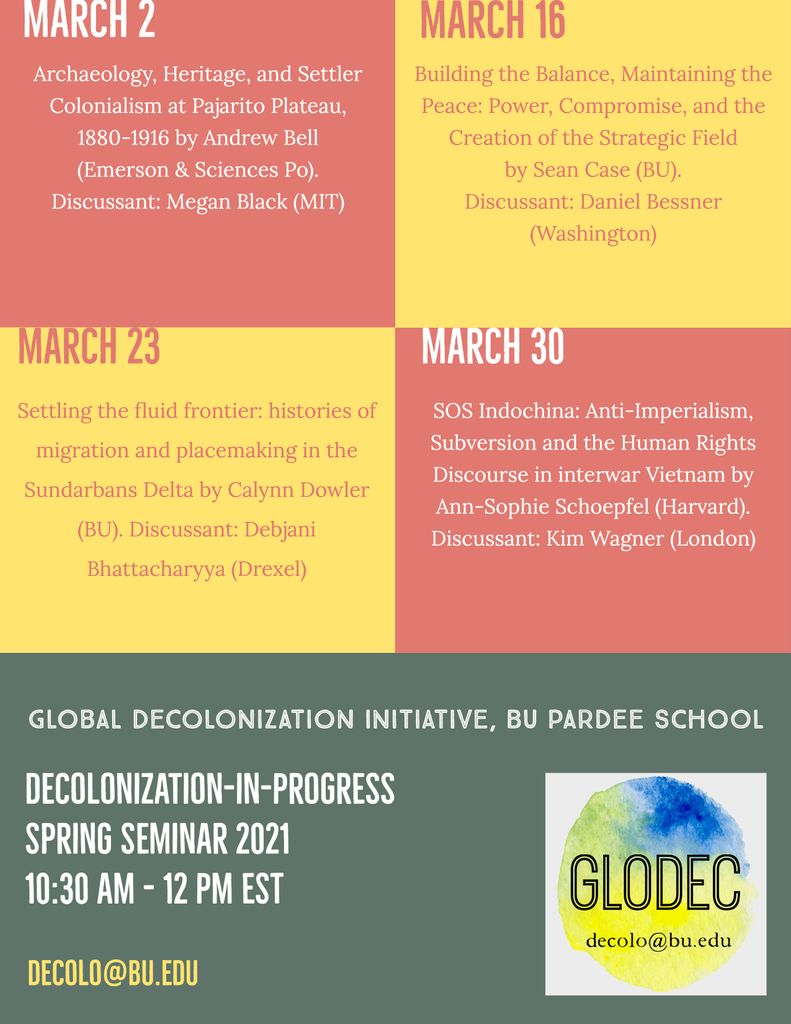“SOS Indochina: Anti-Imperialism, Subversion, and the Human Rights Discourse in interwar Vietnam” (GloDec Seminars, March 30, 2021)
Boston University Pardee School of Global Studies invites you to take part in its
Global Decolonization Initiative (GloDec)
Decolonization-in-Progress Seminar,
March 2021
All seminar sessions will be held on Zoom from 10:30 AM – 12 noon EST
For a complete list of upcoming sessions, including imbedded Zoom links, click here
GloDecMarch2021-final
• Tuesday, March 2, 2021
“Archaeology, Heritage, and Settler Colonialism at Pajarito Plateau, 1880-1916”
Dr. Andrew Bell, Lecture in History at Boston University, and Incoming Marie Curie Fellow at Sciences Po Paris
 Andrew W. Bell, a member of Emerson College’s affiliated faculty, is an historian of the United States in a global context. Andrew Bell’s research focuses on the histories of American foreign relations, empire, science, and archaeological expeditions. He defended his dissertation, “Archaeologists and American Foreign Relations in a World of Empire, 1879-1945,” in May 2020 at Boston University. His research has been supported by the American Philosophical Society, the BU Center for the Humanities, and the Smithsonian Institution, among others. His work has appeared in the Journal of American-East Asian Relations as well as in two edited volumes, Excavating Indiana Jones and Visions of Humanity.
Andrew W. Bell, a member of Emerson College’s affiliated faculty, is an historian of the United States in a global context. Andrew Bell’s research focuses on the histories of American foreign relations, empire, science, and archaeological expeditions. He defended his dissertation, “Archaeologists and American Foreign Relations in a World of Empire, 1879-1945,” in May 2020 at Boston University. His research has been supported by the American Philosophical Society, the BU Center for the Humanities, and the Smithsonian Institution, among others. His work has appeared in the Journal of American-East Asian Relations as well as in two edited volumes, Excavating Indiana Jones and Visions of Humanity.
Discussant: Dr. Megan Black, Associate Professor of History, MIT
 Megan Black is a historian of U.S. environmental management and foreign relations in the late nineteenth and twentieth centuries. She is the author of The Global Interior: Mineral Frontiers and American Power, which analyzes the surprising role of the U.S. Department of the Interior in pursuing minerals around the world—in Indigenous lands, formal territories, foreign nations, the oceans, and outer space. This work garnered four prizes in different subfields, including the George Perkins Marsh Prize from the American Society of Environmental History, Stuart L. Bernath Prize from the Society for Historians of American Foreign Relations, W. Turrentine-Jackson Prize from the Western History Association, and the British Association of American Studies Prize. Professor Black has published articles and review essays in The Journal of American History, Modern American History, Diplomatic History, and American Quarterly. Her new manuscript, tentatively titled “Short-Circuiting Extraction,” will explore anti-mining campaigns in the global 1970s. This project will document how environmentalist groups, local officials, and Indigenous stakeholders adopted increasingly transnational strategies in response to the bids of multinational metals firms to secure minerals underpinning a new communications revolution.
Megan Black is a historian of U.S. environmental management and foreign relations in the late nineteenth and twentieth centuries. She is the author of The Global Interior: Mineral Frontiers and American Power, which analyzes the surprising role of the U.S. Department of the Interior in pursuing minerals around the world—in Indigenous lands, formal territories, foreign nations, the oceans, and outer space. This work garnered four prizes in different subfields, including the George Perkins Marsh Prize from the American Society of Environmental History, Stuart L. Bernath Prize from the Society for Historians of American Foreign Relations, W. Turrentine-Jackson Prize from the Western History Association, and the British Association of American Studies Prize. Professor Black has published articles and review essays in The Journal of American History, Modern American History, Diplomatic History, and American Quarterly. Her new manuscript, tentatively titled “Short-Circuiting Extraction,” will explore anti-mining campaigns in the global 1970s. This project will document how environmentalist groups, local officials, and Indigenous stakeholders adopted increasingly transnational strategies in response to the bids of multinational metals firms to secure minerals underpinning a new communications revolution.
Professor Black previously taught in the Department of International History at the London School of Economics. She has conducted postdoctoral research on fellowships from the Charles Warren Center for Studies in American History at Harvard University and the John Sloane Dickey Center for International Understanding at Dartmouth College.
At MIT, Professor Black offers the courses U.S. Environmental Governance: From National Parks to the Green New Deal and Global Commodities, American Dreams. Her teaching interests span the fields of environmental history, foreign relations history, history of capitalism, science and technology studies, and histories of the U.S. West and settler colonialism.
https://bostonu.zoom.us/meeting/register/tJAodu2oqj0qHND27Vx9Z45EhlKBdN-nR-ev
• Tuesday, March 16, 2021
“Building the Balance, Maintaining the Peace: Power, Compromise, and the Creation of the Strategic Field”
Sean Case, PhD candidate in American Studies, Boston University
 Sean Case is a historian of U.S. foreign policy with his main interest on incorporating military history into diplomatic history. He seeks to situate “military intellectuals” as thought leaders in the crafting of Cold War foreign policy, installing them as members of a “strategic field” comprising diplomats and other civilian experts. Committees with diverse expertise devised strategy, not isolated “strategic geniuses.” To that end, he is deeply interested in grand strategy as an imperial practice from the interwar period to the Vietnam War. His ultimate aim is to uncover the practice of translating individual fears and anxieties into U.S. foreign policy proposals and decisions. His criticism of imperial practices within U.S. foreign policy developed as a result of his deployment to Afghanistan from 2007-2008 with the 82nd Airborne Division.
Sean Case is a historian of U.S. foreign policy with his main interest on incorporating military history into diplomatic history. He seeks to situate “military intellectuals” as thought leaders in the crafting of Cold War foreign policy, installing them as members of a “strategic field” comprising diplomats and other civilian experts. Committees with diverse expertise devised strategy, not isolated “strategic geniuses.” To that end, he is deeply interested in grand strategy as an imperial practice from the interwar period to the Vietnam War. His ultimate aim is to uncover the practice of translating individual fears and anxieties into U.S. foreign policy proposals and decisions. His criticism of imperial practices within U.S. foreign policy developed as a result of his deployment to Afghanistan from 2007-2008 with the 82nd Airborne Division.
At Boston University, Sean Case is a Teaching Fellow for the History of International Relations, 1900 to 1945; the History of the World Wars; the History of War; and the History of International Relations, 1945 to the Present. He has also taught introductory international relations courses to high school students as part of BU’s Summer Challenge program. At the United States Military Academy at West Point, he taught introductory courses on composition and literature and served as co-director for an advanced composition course with cultural studies components focused on Egypt and the Maghreb/North Africa, respectively.
Discussant: Dr. Daniel Bessner, Associate Professor, University of Washington
 Daniel Bessner (Ph.D., Duke University) is the Anne H.H. and Kenneth B. Pyle Assistant Professor in American Foreign Policy in the Henry M. Jackson School of International Studies at the University of Washington.
Daniel Bessner (Ph.D., Duke University) is the Anne H.H. and Kenneth B. Pyle Assistant Professor in American Foreign Policy in the Henry M. Jackson School of International Studies at the University of Washington.
Daniel works on intellectual and cultural history, U.S. foreign relations, the history of democratic thought, and the history of the social sciences. He is the author of Democracy in Exile: Hans Speier and the Rise of the Defense Intellectual, which is part of the United States in the World series at Cornell University Press.
Daniel’s next book is provisionally entitled The RAND Corporation: A History, and is under advance contract with Princeton University Press. Finally, he is co-editor, with Nicolas Guilhot, of The Decisionist Imagination: Sovereignty, Social Science, and Democracy in the Twentieth Century, which will be published by Berghahn Books in the autumn of 2018.
https://bostonu.zoom.us/meeting/register/tJcudemgrTIvH9xjGUZl2oiDnZQlwL0lzVjl
• Tuesday, March 23, 2021
“Settling the fluid frontier: histories of migration and placemaking in the Sundarbans Delta”
Calynn Dowler, PhD candidate in Anthropology, Boston University
 Calynn Dowler’s research lies at the intersection of environmental anthropology, religious studies, and the anthropology of development. Calynn holds a BA in Political Science and German from Gettysburg College. She completed her MA in Migration Studies as a Fulbright scholar at the University of Sussex in 2011-12. Her MA dissertation explored interpretations of Islamic alms-giving (zakat) among members of the Bangladeshi diaspora active in transnational faith-based NGOs in Tower Hamlets, London. Currently.
Calynn Dowler’s research lies at the intersection of environmental anthropology, religious studies, and the anthropology of development. Calynn holds a BA in Political Science and German from Gettysburg College. She completed her MA in Migration Studies as a Fulbright scholar at the University of Sussex in 2011-12. Her MA dissertation explored interpretations of Islamic alms-giving (zakat) among members of the Bangladeshi diaspora active in transnational faith-based NGOs in Tower Hamlets, London. Currently.
A Ph.D. candidate in anthropology at Boston University, her dissertation explores changing material and moral entanglements with water in the Sundarbans delta of West Bengal, India. The project employs archival and ethnographic methods to understand shifting discourses and practices relating to water among Hindu, Muslim, and Christian fishers and farmers on a riverine island. In this religiously and ethnically diverse setting, relations with the deltaic waterscape have historically been animated by engagements with the nonhuman animals, deities, ghosts, and spirits which dwell there, generating shared reservoirs of moral meaning and ethical orientation. In recent years, however, religious reform, changes in water rights and access, development initiatives, and climate change have begun to transform relationships among people, water, and the sacred to an unprecedented degree. My research explores the effects of these changes on senses of place and personhood, religious identity, and environmental ethics.
Discussant: Dr. Debjani Bhattacharyya, Associate Professor of History, Drexel University
 Debjani Bhattacharyya, PhD, explores the intersection of legal and environmental history. Professor Bhattacharyya’s research is driven by the desire to understand how legal and economic structures order our conceptualization of environmental transformations and shape how we respond to climate crisis. Her book, Empire and Ecology in the Bengal Delta: The Making of Calcutta (Cambridge University Press, 2018) won the 2019 honorable mention for the best book in Urban History. The book documents how legal experimentation through the 18th and 19th century was central to reshaping the political economy of urban land and waterscapes in the Bengal delta. Through an environmentally grounded history of the urban land market, it argues that ecological change influenced practices of land speculation, urban planning and property law and shows how marshes were transformed into speculative property in the Bengal Delta.
Debjani Bhattacharyya, PhD, explores the intersection of legal and environmental history. Professor Bhattacharyya’s research is driven by the desire to understand how legal and economic structures order our conceptualization of environmental transformations and shape how we respond to climate crisis. Her book, Empire and Ecology in the Bengal Delta: The Making of Calcutta (Cambridge University Press, 2018) won the 2019 honorable mention for the best book in Urban History. The book documents how legal experimentation through the 18th and 19th century was central to reshaping the political economy of urban land and waterscapes in the Bengal delta. Through an environmentally grounded history of the urban land market, it argues that ecological change influenced practices of land speculation, urban planning and property law and shows how marshes were transformed into speculative property in the Bengal Delta.
You can hear Professor Bhattacharyya discuss her book Empire and Ecology in the Bengal Delta: The Making of Calcutta (July 2020), and talk about her other research, including Urbanism at Water’s Edge: The Fluid Histories of Property in Calcutta (May 2020), and Empire and Ecology (July 2020).
Currently, she is a fellow at the Center for the Advanced Study of India, University of Pennsylvania. She is at work on her second book, Monsoon Landscapes: Credit, Climate and Calamity, about the long history of how marine insurance market’s risk apprehensions shaped weather knowledge, colonial oceanographic sciences and a derivatives market in climate futures in the Indian Ocean Region. She is a member of the Collaborative Platform of Ocean Space and an international collaborator in the Narrative Science Project, London School of Economics. Her program of research has been supported by American Institute of Indian Studies, The History Project funded by the Joint Centre for History and Economics, Harvard University, and Social Science Research Council. She held visiting fellowships at International Institute of Asian Studies (Leiden), Max-Planck-Institute for Legal History (Frankfurt) and the Shelby Cullom Davis Center for Historical Studies, Princeton University.
Professor Bhattacharyya’s work has been published in the Journal of Social and Economic History of the Orient; Comparative Studies in South Asia, Africa and the Middle East; Oxford Research Encyclopedia for Asian Studies; Economic and Political Weekly; Global Environment and Modern Asian Studies. She is the South Asia editor for History Compass and serves on the editorial boards of Environment and History and Comparative Studies in South Asia, Africa and the Middle East. Her writings have also appeared in The Telegraph, Amrita Bajar Patrika, n+1, The Diplomat and Somatosphere.
She offers classes on South Asian History, environmental history, legal history, urban history and climate history. She was the recipient of the 2018 CoAS Teaching Excellence Award.
https://bostonu.zoom.us/meeting/register/tJYpfuusqzIrE9VE5TnQ139IYkP9ArUn4Msf
• Tuesday March 30, 2021
“SOS Indochina: Anti-Imperialism, Subversion and the Human Rights Discourse in interwar Vietnam”
Ann-Sophie Schoepfel, Fellow at the Weatherhead Initiative on Global History, Harvard, and Visiting Professor, Sciences Po Paris
 Ann-Sophie Schoepfel is a historian of international law, professor in history at Sciences Po Paris, and director of the seminar in global history and international law. She completed two PhDs at the University of Heidelberg and Lorraine University. Her first PhD, based on inedite sources, examined for the first time the Saigon war crimes trials in Indochina; the second reexamined the Tokyo Trial through the lens of colonialism, and re-creation of the liberal world order. Her research focuses on the history of international law, humanitarianism, migration and memory. It was awarded the Jean-Baptiste Duroselle Prize in history of international relations. Her work has been published in peer-reviewed journals and edited volumes. At Harvard, she will complete her new monograph on the imperial origins of international law in the French empire and Global South.
Ann-Sophie Schoepfel is a historian of international law, professor in history at Sciences Po Paris, and director of the seminar in global history and international law. She completed two PhDs at the University of Heidelberg and Lorraine University. Her first PhD, based on inedite sources, examined for the first time the Saigon war crimes trials in Indochina; the second reexamined the Tokyo Trial through the lens of colonialism, and re-creation of the liberal world order. Her research focuses on the history of international law, humanitarianism, migration and memory. It was awarded the Jean-Baptiste Duroselle Prize in history of international relations. Her work has been published in peer-reviewed journals and edited volumes. At Harvard, she will complete her new monograph on the imperial origins of international law in the French empire and Global South.
Discussant: Kim Wagner, Professor of History, Queen Mary University of London
 Kim Ati Wagner is a Danish-British historian of colonial India and the British Empire at Queen Mary, University of London. He has written a number of books on India, starting with Thuggee: Banditry and the British in early nineteenth-century India in 2007. He followed that up with a source book on Thuggee and has also written on the uprising of 1857 and the Amritsar massacre. A British citizen, Wagner feels an affinity for India.
Kim Ati Wagner is a Danish-British historian of colonial India and the British Empire at Queen Mary, University of London. He has written a number of books on India, starting with Thuggee: Banditry and the British in early nineteenth-century India in 2007. He followed that up with a source book on Thuggee and has also written on the uprising of 1857 and the Amritsar massacre. A British citizen, Wagner feels an affinity for India.
In 2003, under the supervision of Christopher Bayly, he gained a PhD in South Asian history from the University of Cambridge. He subsequently completed a four-year research fellowship at King’s College there, followed by a two-year research associate post at the University of Edinburgh. Wagner then became a lecturer in imperial and World history at the University of Birmingham, before being employed at Queen Mary’s in 2012. In 2015 he was granted a Marie Skłodowska-Curie Global Fellowship working with historian Dane Kennedy at George Washington University in the United States, which he finished in 2018.
https://bostonu.zoom.us/meeting/register/tJwtd-2hrzkiGdH1uUV405Dj74-mWc_IBLJ2
Fall 2021 Seminar:
**If you are a junior scholar who wants to workshop a completed draft of your ongoing research in the Fall
of 2021 (meetings in November), please send an email to GloDec (decolo@bu.edu) with a copy to its director
(jsarkar@bu.edu) with “GloDec Work-in-Progress Seminar Fall 2021” in the subject line.
